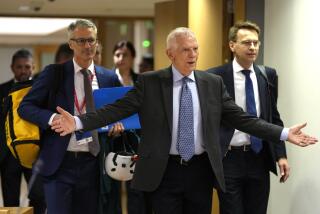IMF Approves $6.25-Billion Russian Loan
- Share via
MOSCOW — Despite a budget-busting war against Chechen separatists, an ever-weakening ruble and political pressures to spend more on a suffering public, Russia won International Monetary Fund approval Friday of a $6.25-billion standby loan.
IMF Managing Director Michel Camdessus said he was compelled to give his “vote of confidence” in Russia’s commitment to carrying through painful market reforms after careful analysis of recent belt-tightening measures and long consultations with those charting the transition out of the current economic morass.
But the decision was probably the lesser of two evils facing the IMF, as depriving Russia of the money needed to stop inflation and encourage investment would have undermined the already struggling forces for reform.
“The Russian government has put together a program that, if fully implemented, would present a major advance in stabilizing the Russian economy and will sow the seeds for the recovery of production and the living standards of the Russian people,” Camdessus told reporters after signing the loan with Russian Prime Minister Viktor S. Chernomyrdin.
Approval of the loan, to be doled out in $500-million monthly installments after an initial disbursement of $1.1 billion next month, was seen as a move by the international community to rally around embattled President Boris N. Yeltsin and those members of his government still unequivocally supporting market reforms.
The agreement was expected to have the added benefits of removing an obstacle to a $600-million oil industry rehabilitation loan from the World Bank and as an impetus for new talks with Moscow’s creditors, known as the Paris Club, on $40 billion in foreign debts.
IMF officials balked at the standby loan after Russian troops invaded the breakaway republic of Chechnya in December, taking on a widely condemned military venture estimated to be costing the government billions.
International lenders had also been waiting for evidence that Moscow’s projected 1995 budget was based on credible figures for expected revenue and ruble values. The budget, passed late last month, assumed the September ruble exchange rate of 2,300 per dollar, yet inflation has already pushed the figure to almost 4,700.
Camdessus appeared swayed by the drop in the galloping monthly inflation rate from 18% in January to 11% last month, though prices are expected to be hit hard in the next few months as the costs of the Chechen war are passed on to the public.
Asked if approval of the loan was not tantamount to bankrolling the Russian war effort, Camdessus said he was not in Moscow to pass judgment on anything but the government’s commitment to economic stabilization.
“If we were to wait in all parts of the world for countries to have resolved all their political problems, including when they are of the magnitude of the Chechnya one, we would not be active in many parts of the world,” Camdessus replied.
More to Read
Sign up for Essential California
The most important California stories and recommendations in your inbox every morning.
You may occasionally receive promotional content from the Los Angeles Times.














